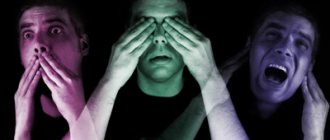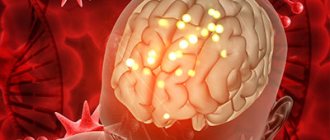The harmful effects of alcohol-containing products on the body have been known for a long time. Abuse of alcoholic beverages for quite a long time leads to the development of various pathologies. Quite often in alcoholics it is detected Korsakov's amnestic syndrome, expressed in memory disorders. The patient loses the ability to remember current events, while memory of the past is still present.
The Russian psychiatrist S.S. Korsakov studied and described this condition, and the syndrome later received his name.
Initially, it was believed that such memory impairments occur as a result of prolonged consumption of alcohol in large quantities. But further research of this issue by other psychiatrists showed that the main reason for the development of the pathology described by Sergei Korsakov is a lack of vitamin B1, which can be caused by various disorders of the entire central nervous system and individual areas of the brain, including age-related degenerative processes.
Modern psychiatry considers Korsakov's syndrome as an independent nosological unit, which is a special type of amnesia.
General information about Korsakoff psychosis
Psychosis should not be confused with Korsakoff's syndrome. In the first case, the disease implies an alcoholic etiology (origin), while the development of the syndrome can be caused by other reasons not related to abuse , for example: traumatic brain injury, infection, hypoxia, tumors, various dementias.
Alcoholic Korsakov psychosis, as a mental disorder caused by prolonged exposure to alcohol on the human brain with mnestic disorders, as well as positive and negative symptoms, was first described by the Russian psychiatrist S. S. Korsakov in 1887. The disease occurs in a chronic form, observed in approximately 5% of those suffering from alcoholism. As a rule, it affects elderly people, less often middle-aged people. In most cases, the disease is accompanied by other pathologies caused by prolonged alcohol consumption (liver cirrhosis, cardiovascular diseases, dysfunction of the digestive system).
Diagnostic methods
A diagnosis such as Korsakoff syndrome can be made after detecting signs of vitamin B1 deficiency. A blood test and testing of basic liver functions can indicate a thiamine deficiency. In addition, a general examination of the patient is carried out. However, to make a clinical diagnosis, it is necessary to have a stable symptom - impaired memory function due to prolonged use of alcoholic beverages. Psychological tests for memorizing phrases or individual words help identify memory problems.
For treatment to be successful, it is important at the diagnostic stage to differentiate Korsakov's syndrome from other pathological processes in the nervous system, which can also be caused by alcoholism. It is also important to rule out other disorders that may cause memory problems that are not related to alcohol use. These include: dementia, organic brain damage, depressive disorders, etc.
Causes of development of Korsakoff psychosis
The development of the disease occurs over a long period of time - 10–20 years. Symptoms of the chronic disorder often appear after an exacerbation of the psychosis that results from alcoholic encephalopathy. Also, the manifestation of characteristic symptoms can provoke complex delirium. Much less often, pathology develops in conditions of relative well-being in mental terms, without preliminary phenomena of a psychotic nature. Many sources cite the presence of somatic pathologies (especially the digestive system and liver) or traumatic injuries as provoking factors.
Pathogenesis
There is an opinion that Korsakov's psychosis in alcoholism develops due to acute acquired deficiency of nicotinic acid and thiamine. A deficiency of biologically active substances occurs due to poor nutrition and disruption of the digestive system. Ethyl alcohol has a stimulating effect on the functioning of the small intestine, which plays a leading role in the process of digesting food and absorbing substances necessary for the normal functioning of the body. Due to the high speed of chyme movement, the small intestine is not able to properly absorb the required amount of vitamins. Atrophy of the intestinal mucosa, a characteristic result of prolonged exposure to alcohol, also a negative The lack of biologically active components leads to gradual degradation of limbic structures. Histological studies reveal massive death of the nerve tissue of the brain, which is also accompanied by the destruction of the nervous tissue of the spinal cord.
Symptoms
Wernicke's syndrome consists of a core in the form of the following symptoms:
- Ophthalmoplegia is paralysis of the eye muscles due to damage to the oculomotor nerves.
- Nystagmus is oscillatory eye movements in one direction with a frequency of up to 100-120 rotations per minute.
- Ataxia is a violation of the coordination of muscles of different groups.
- Confusion of consciousness – orientation in space is disturbed.
Wernicke encephalopathy can also manifest itself as a decrease in body temperature, increased heart rate, constipation, flatulence, and decreased tactile sensitivity in the legs.
A complication of encephalopathy is amentia. This is a variant of a disorder of consciousness in which there is incoherent speech, impaired thinking, disorientation in time and space, disorientation in one’s own personality (the patient cannot say his name, he does not even know who he is). Emotions and body movements do not match the situation. The patient is excited, tearful, cheerful, restless - these states replace each other.
Korsakov's psychosis is the inability to remember new information. Amnesia is often accompanied by confabulations. Confabulation is a memory disorder in which the patient reports events that happened to him that did not actually happen. In contrast to the inability to remember information, emotional memory is preserved - the patient remembers what is emotionally important to him.
Symptoms of Korsakov's psychosis
The first symptoms of Korsakoff psychosis appear long before the development of signs of a full clinical picture of the disease. Within 1–2 years before the formation of pathology, patients complain of aches, sensory disturbances and nagging pain in the lower extremities. The gait becomes unsteady. Problems become especially obvious a day after drinking alcohol. mental begin to appear - decreased quality of sleep, decreased sphere of interests, anxiety without an objective reason, fears.
At the next stage, as a rule, during the next binge or after the onset of a somatic illness, delirium begins, which results in the formation of a classic clinical picture of Korsakov's psychosis. Deterioration of the psyche without hallucinations and clouding of consciousness is possible, but such a development of the disease is observed quite rarely. Classic signs of pathology:
- severe form of amnesia;
- false memories;
- loss of orientation;
- polyneuritis of the legs.
Patients are most often aware of the presence of mental defects, so they try to hide them. They avoid direct answers when it comes to their well-being and try to steer the conversation in a different direction. Gaps in memory are replaced by fantasies, assumptions , passed off as events that actually happened. Facts get mixed up and lose their objective connection to place and time.
Other signs of Korsakov's psychosis are observed, for example, the manifestation of affective disorders - lethargy, passivity, or, conversely, causeless fussiness. There may also be manifestations of carelessness, bravado, inappropriate complacency or unreasonable anxiety accompanied by confusion. Deviations in the functioning of the nervous system become noticeable.
The disease occurs in one of two forms - regressive or stationary. In the first case, the manifestation of amnesia decreases, the volume of memories increases, including about past events. The stationary form is characterized by persistence of memory dysfunction.
Manifestations of Korsakov's syndrome
According to medical reference books and a large psychological encyclopedia, the main symptom of this disease is the inability of a sick person to remember and reproduce new information (fixation amnesia). Everything that happened before the illness was well preserved in memory. A person’s consciousness does not record events that happened with his participation very recently or are happening at the moment. Clinically this manifests itself as follows:
- the patient is poorly oriented in space if he finds himself in a new place. While in a hospital, a person is unable to find the room or bed he needs, but at home such problems do not arise. This is because long-term memory works relatively normally. Moving to a new place or simply rearranging furniture can become severe stress for the patient, which can give impetus to the rapid progression of the disease;
- disorientation in time. If a person has been diagnosed with Korsakoff syndrome , then most likely he will not be able to correctly name today's date, month and year. He simply does not understand where he is and what is happening to him;
- in a conversation, the patient mentions events that have never happened to him (confabulation). The patient's stories can be fantastic; you can hear from him that yesterday he fought with monsters in another universe or sailed in a submarine. Those around him consider this to be fiction or an outright lie, but the patient himself has no idea that he is telling a lie;
- events that have ever taken place in a person’s life are shifted in time space (pseudo-reminiscences). In this way, memory gaps are involuntarily filled. A person’s stories are quite ordinary in nature; he can say that yesterday he went to the theater for a new production or went out of town. But in fact, these events happened much earlier;
- replacing gaps in memory with events from movies or books. The patient has some information, but he does not know when and how he received it. For example, he can pass off a poem he once memorized as his own work. Over time, the sick person perceives other people's thoughts as his own.
- Concentration is difficult, willpower is reduced.
Korsakoff's syndrome is often accompanied by retrograde or anterograde amnesia. The patient's emotional state is unstable. Lethargy, indifference and apathy are replaced by complacency and euphoria.
Diagnosis of Korsakov's alcoholic psychosis
For specialists, identifying Korsakov's alcoholic polyneuritic psychosis is not difficult. The presence of pathology is obvious. The diagnostic procedure includes:
- Examination by a psychiatrist. The nature of amnesia, its severity, the degree of loss of orientation, the presence of hallucinations, and delusions are clarified. A significant role is played by the patient’s relatives and friends, who are able to provide truthful information about the patient’s behavior in everyday life, the duration of alcohol consumption, the presence of preliminary symptoms and triggering factors of the disease.
- Examination by a neurologist. The presence and degree of development of polyneuritis is revealed. The doctor also pays attention to muscle atrophy, paresis of the limbs, function of the eye muscles, identifies the presence of an unsteady gait, and a violation of the coordinated functioning of the muscles.
- Examination by specialists of various profiles. There is often a need to seek advice from a cardiologist, gastroenterologist and other highly specialized doctors to clarify the presence and degree of development of somatic disorders.
- Laboratory research. It is necessary to undergo hardware examinations - EEG, MRI of the brain and abdominal cavity, computed tomography (CT) of internal organs. A detailed biochemical blood test is also required.
It is necessary to carry out differential diagnosis. Some symptoms of the disease are also characteristic of: Korsakoff's syndrome, atherosclerosis, progressive paralysis.
Diagnosis of the disease
The syndrome can be assumed based on the characteristic symptoms and the presence of a problem with alcohol in the patient.
To confirm the diagnosis, the following are prescribed:
· Blood analysis;
· CT scan;
· Magnetic resonance imaging with contrast;
· Neurological examination neuromyography to determine neural conductivity;
· 24-hour urine test to determine thiamine levels.
Even the appearance of characteristic symptoms is already a prerequisite for starting therapy and taking vitamin B.
Treatment of Korsakov's psychosis
If Korsakoff psychosis is clearly diagnosed, treatment will be comprehensive, aimed at localizing the damage and restoring various body functions. The acute course of the disease requires keeping the patient in a hospital setting. Treatment is carried out by psychiatrists, narcologists, neurologists and other specialized specialists. List of therapeutic measures:
- Eliminating the possibility of drinking alcohol. An obligatory and main component of treatment. Already at this stage, restoration of some functions is observed, and the risk of further deterioration of the condition is significantly reduced.
- Detoxification. It starts from the first days of therapy. Includes infusion of saline solutions, administration of glucose, and the use of other drugs.
- Vitamin therapy. It consists of saturating the body with B vitamins. This is an effective method of treating polyneuritis, eliminating or significantly reducing the manifestation of neurological disorders.
- General care and supervision. Necessary for serious problems with orientation, passivity, and severe forms of amnesia. The medical staff monitors the implementation of hygiene procedures, compliance with the regime, and physical activity. Bedridden patients require special care to resist the development of pressure ulcers and hypoventilation pneumonia.
- Physiotherapy. Massage, hardware, gymnastics to prevent complications of diseases of internal organs, alleviate polyneuritis, stop muscle atrophy.
After the exacerbation has resolved, further observation is possible in a hospital setting or at home, if relatives and friends guarantee compliance with doctors’ orders.
Treatment of Wernicke-Korsakoff syndrome
In the early stages, the disease may show improvement with taking large amounts of vitamin B1 (thiamine). Therefore, it is very important that the patient or his relatives, at the first suspicion of the disease, seek qualified help.
· Thiamine is most often prescribed intramuscularly at 50–100 mg, less often intravenously. Injections are performed 2 times a day until the condition clearly improves, after which vitamin B can be prescribed in tablet form.
· To correct hypomagnesemia (which often develops along with a lack of vitamin B), magnesium sulfate is prescribed intramuscularly, 1-2 milliliters.
· Ascorbic and nicotinic acid.
· Other vitamin complexes.
Before starting treatment, the drinking patient must stop drinking and undergo body cleansing .
When the disease is advanced, such as severe amnesia or aggressiveness, there is no effective treatment. However, thiamine helps in providing relief after months of therapy.
Important: every person who is at risk or susceptible to this disease should regularly take B vitamins for prevention purposes.
Forecast and prevention of Korsakoff psychosis
In general, if the prescribed treatment is followed, the prognosis is favorable. Korsakoff psychosis tends to have a regressive course, especially in middle-aged and young patients. If the severity of amnesia does not decrease, then successful learning to compensate for impaired memory function is possible. Partial restoration of working capacity is possible in most cases, complete restoration is extremely rare. Some intellectual and emotional problems persist. Adverse consequences are possible if medical care is not provided in a timely manner: dementia, transition of the disease to a malignant form with a fatal outcome within 1–2 years.
The only prevention is absolute lifelong abstinence from drinking alcohol.
How common is Wernicke-Korsakoff syndrome?
· Wernickes occurs in 0.1–2.3% of the population, much more often in alcoholics.
· Obtaining accurate statistics is complicated by the fact that many patients do not seek help and are not diagnosed.
· No more than 20% of all cases of acute hemorrhagic polioencephalitis are recorded during life, and about 80% are discovered during autopsy after death.
· About 17% of all older people have thiamine B1 deficiency and are at risk if they drink alcohol.










